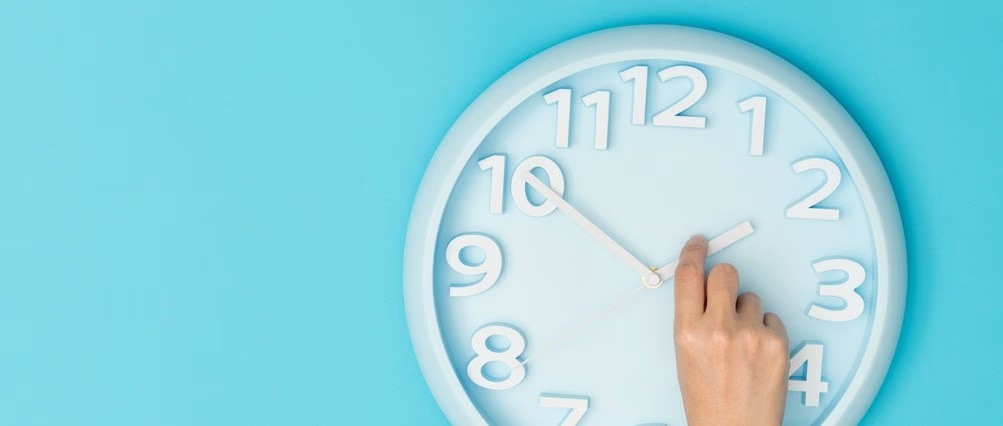
Daylight Savings Time: Why the clocks changing can affect our health
Peer reviewed by Dr Krishna Vakharia, MRCGPLast updated by Lydia SmithLast updated 24 Oct 2023
The days are getting colder and shorter, which means autumn has arrived in the UK. Soon, the clocks will jump back by an hour to mark the end of Daylight Savings Time or British Summer Time. Although this will give us an extra hour in bed, the clocks changing could have an impact on our health.
In this article:
Continue reading below
Why do our clocks change?
In Britain, the clocks will move back by one hour at 2am on Sunday 29th October. We change the clocks to make better use of natural daylight in the morning.
Between March and October - during Daylight Saving Time - an hour of daylight is borrowed from the morning and added to the end of the day. At the end of October, we push the clocks back and return to standard time or Greenwich Mean Time.
The United States, Canada, Australia and New Zealand - as well as European countries like France, Germany, Italy, Poland and Spain - also change their clocks.
Every year, the clock change causes an argument about whether we should continue the practice. Some people welcome the change as it marks the start of a new season, but others argue that it’s an inconvenience.
However, some researchers suggest that changing the clocks can have a serious effect on our health because of the disruption to our circadian rhythms.
Circadian rhythms are physical, mental and behavioural changes that follow a 24-hour cycle that regulate things like alertness, sleepiness and appetite. These processes tend to be aligned with the cycle of day and night.
According to research, moving our clocks forward or back by an hour can disturb these natural rhythms - leading to several health issues.
Mood problems
Research has linked the clocks changing to an increase in mood problems such as depression or seasonal affective disorder1. When the clocks go forward in the spring, it means we have darker mornings and lighter evenings.
Less morning light can lower levels of the mood-boosting hormone serotonin, which can affect how you feel emotionally - especially if you already have a mental health issue such as depression.
Research has also linked the clocks going forward to mood problems. A US study found an 11% increase in depressive episodes during the switch from daylight saving to standard time2.
Disrupted sleep
The clocks changing can also affect our sleep schedules, which in turn can affect our mood and ability to concentrate. The shift can mean we go to bed and wake up earlier or later than usual - and the disruption can lead to insomnia or interrupted sleep.
Although these problems are usually temporary - lasting a few days or weeks - it can make us feel tired and foggy.
This fatigue may also lead to accidents. A study of 732,000 car accidents over two decades found that the annual switch to Daylight Saving Time is associated with a 6% increase in fatal car crashes that week3.
Increased risk of cardiovascular disease
The disruption to our circadian rhythms may also be linked to heart disease, according to some studies - although the exact reason why is unknown.
A study review found that the risk of heart attacks increased “modestly but significantly” after the shift to daylight saving time in the spring but not in winter clock change4.
According to the researchers, the abrupt change to the ‘sleep-wake cycle’ has been linked to inflammation and imbalances in the nervous system.
Another study found that moving into daylight saving time is associated with a higher risk of cardiovascular disease, mental health problems and immune-related disorders5.
How to manage the clocks changing
Get fresh air
Getting outside and exercising frequently are both useful ways to help you reset your internal body clock. Going for a walk first thing after you wake up may help you adjust to the day after the clocks change.
Avoid caffeine
Stimulants like caffeine can keep you awake and throw off the natural balance between sleep and wakefulness. If you are having trouble sleeping at night, it may help to avoid coffee after midday.
Limit light before bed
Artificial light exposure at night can interfere with your circadian rhythm. Try to avoid using electronic devices that emit blue light - like phones and laptops - in the lead-up to bedtime.
Keep naps short and early in the afternoon
When you’re feeling tired, it’s tempting to have a nap - but longer naps or napping later in the day can mean you struggle to sleep at night. If you do have a nap, keep it short at around 20 minutes.
Follow a consistent sleep schedule
Sticking to a bedtime or morning wake-up time can help your body adjust to a stable circadian rhythm. Get your bedroom ready for a good night’s sleep by making it dark and comfortable. Try to relax before bed, for example, by having a bath or reading a book.
Seek help if you’re struggling with your mental health
If you’re experiencing depression, anxiety or another mental health problem, it’s important to speak to your doctor for advice. You can also self-refer for counselling on the NHS.
Continue reading below
Further reading
Article History
The information on this page is written and peer reviewed by qualified clinicians.
24 Oct 2023 | Latest version
24 Oct 2023 | Originally published
Authored by:
Lydia Smith

Feeling unwell?
Assess your symptoms online for free